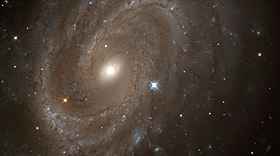NGC 4603
| NGC 4603 | |
|---|---|

A Hubble Space Telescope (HST) image of NGC 4603.
|
|
| Observation data (J2000 epoch) | |
| Constellation | Centaurus |
| Right ascension | 12h 40m 55.195s |
| Declination | –40° 58′ 35.05″ |
| Helio radial velocity | +2561km/s |
| Distance | 106.8 Mly (32.71 Mpc) |
| Apparent magnitude (V) | 12.3 |
| Characteristics | |
| Type | SA(s)c |
| Apparent size (V) | 3′.4 × 2′.5 |
| Other designations | |
| PGC 42510 | |
NGC 4603 is a spiral galaxy located about 107 million light years away in the constellation Centaurus. It is a member of the Centaurus Cluster of galaxies, belonging to the section designated "Cen30". The morphological classification is SA(s)c, which indicates it is a pure spiral galaxy with relatively loosely wound arms.
During 1999, this galaxy was the subject of an extended study using the Hubble Space Telescope to locate Cepheid variable stars. A total of 43±7 were found, and the measurement of their periodicity gave a net distance estimate of 108.7+5.5
−4.9 Mly (33.3+1.7
−1.5 Mpc). This is consistent with the distance estimate determined through redshift measurements. As of the time of this study, NGC 4603 was the most distant galaxy for which a distance estimate had been made using Cepheid variable.
On May 21, 2008, supernova SN 2008cn was discovered at a position 23.″2 north and 4.″7 east of the galaxy center. It was determined to be a high-luminosity Type II-P supernova, with a progenitor tentatively identified as a red supergiant with 15 ± 2 solar masses. Based upon the yellowish color, it may have been a member of a binary star system.
...
Wikipedia
